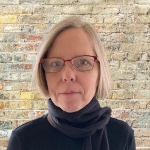
I felt a bit awkward that first night of our ICJS Congregational Leaders Fellowship. As a Christian discussing religious differences with Jews and Muslims, I wondered which questions were appropriate and which might be too bold. I silently berated myself for not knowing more about Islam. But as we each took our turn speaking, the tension eased, and our conversation flowed. My questions were answered warmly and enthusiastically. Near the end of the evening’s dialogue, one participant explained a little about his current shared leadership role at his mosque. His pride, commitment, and devotion shone through each word, and this touched me deeply. On the drive home that night, I wondered what it would mean to be that devoted to my church, to take commitments to my faith community that seriously. And my wondering and reflection didn’t stop after the drive home. It stuck with me. I’m still pondering the question.
Later in our interreligious fellowship, I was privileged to attend a Saturday morning shabbat service with a Jewish congregation. The warmth and joy of the service was almost indescribable. It filled the space and filled my heart. I truly felt the presence of God. At one point, the rabbi invited those in need of healing to step forward to the Torah, allowing the sacred Hebrew scriptures to carry some of the spiritual weight of the healing. One congregant walked up and stood near the Torah with the rabbi, both of them draped in a single prayer shawl. I felt so honored to witness this holy moment. The service ended with vibrant singing and clapping, even a little swaying and dancing. At several moments during the service, I felt myself so moved, I was near tears. After I left, I tried to remember a recent time when I’d experienced such warm and joyful worship. And I wondered what, exactly, creates that sense of warmth, joy, and intimacy in worship. What’s the recipe?
On another occasion, I attended an open house at a Christian church of a different denomination. We toured their historic building and cemetery, then visited a strikingly original monument to their former church, which had been destroyed in a fire years earlier. A portion of the burned church’s facade, incorporating two original windows, stood with an engraved marker on the site. The member who led our tour radiated immense love, loyalty, and rootedness to her church and its history, and I felt awed by her faithful witness to those past generations. I couldn’t help wondering how transformative it would be, to feel that connected to a congregation, both past and present. As we worked our way around the monument and among centuries-old tombstones—some so time-worn the names were erased—I thought of the “great cloud of witnesses” our Christian scriptures reference, meaning those who have passed on before us to eternal life, and how this congregations honors and remembers them.
Each interreligious (and intra-religious) encounter during my congregational fellowship with ICJS moved me deeply and led me to reflect on my own faith journey, spiritual practice, and role in my own church. They were encounters in the truest sense of the word, because they contained the unexpected. One meaning of encounter, after all, is to meet someone unexpectedly. Although these meetings themselves weren’t unexpected, I could never have predicted what I would learn, observe, and experience. The connections surprised and inspired me. I will always treasure them.
I hope to continue learning about, participating in, and perhaps even leading interreligious work in my church. This work is important for so many reasons. It can lead us to examine and deepen our own faith and practices. It can build bridges of understanding so desperately needed in our political climate. It can make us more sensitive to religious bigotry aimed at other faiths. And, based on my own experience, it can take us by surprise in the best possible way, revealing sacred beauty in religious traditions very different from our own.
 Amelia Franz is a member of St. Francis Episcopal Parish and Community Center and was a member of the 2023 ICJS Congregational Leaders Fellowship. Learn more about the ICJS Congregational Leaders programs here.
Amelia Franz is a member of St. Francis Episcopal Parish and Community Center and was a member of the 2023 ICJS Congregational Leaders Fellowship. Learn more about the ICJS Congregational Leaders programs here.
Opinions expressed in blog posts by the ICJS Congregational Leader Fellows are solely the author’s. ICJS welcomes a diversity of opinions and perspectives.